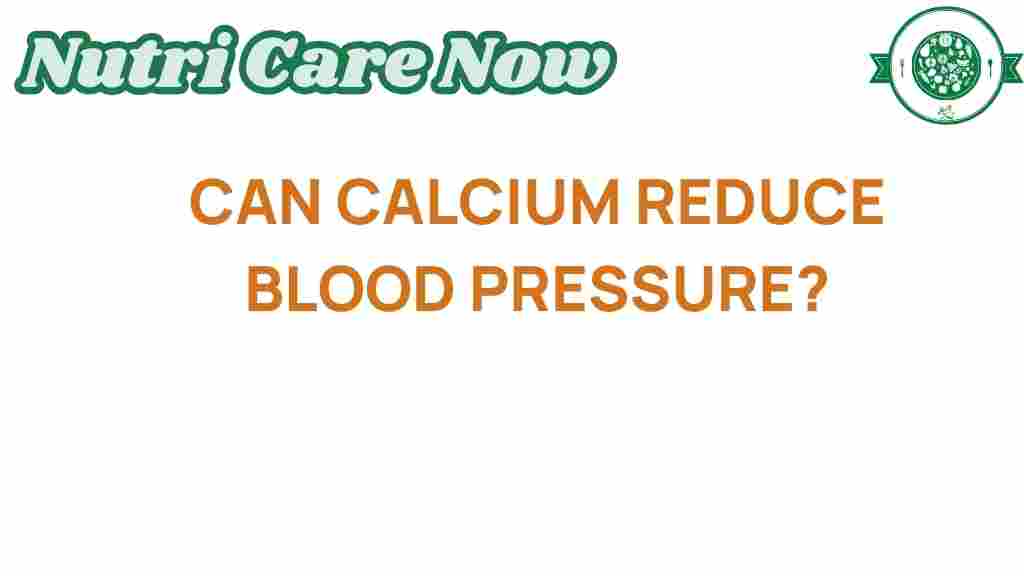Unveiling the Power of Calcium: Can It Lower Blood Pressure?
Calcium is often recognized for its vital role in building and maintaining strong bones, but its benefits extend far beyond skeletal health. Recent research has brought to light the potential of calcium in influencing blood pressure levels. As we navigate through the complexities of nutrition and wellness, understanding the relationship between calcium and blood pressure is essential for heart health and managing hypertension.
The Importance of Calcium in Our Diet
Calcium is one of the most abundant minerals found in the human body. It plays a crucial role in various physiological processes, including:
- Bone formation and maintenance
- Muscle contraction
- Nerve transmission
- Blood clotting
With such a significant role, ensuring adequate calcium intake through diet is vital for overall health and wellness. But how does calcium specifically impact blood pressure? Let’s delve into the research.
Calcium and Blood Pressure: What the Research Says
Several studies have explored the connection between calcium intake and blood pressure regulation. Here are some key findings:
- A meta-analysis published in the American Journal of Hypertension found that higher calcium intake is associated with lower blood pressure in adults.
- Research indicates that calcium may help relax blood vessels, which can contribute to lower blood pressure levels.
- Some studies suggest that calcium supplementation might be beneficial for individuals with hypertension, although results can vary.
While the evidence is promising, it’s essential to consider calcium as part of a broader dietary approach to managing blood pressure.
Understanding Hypertension
Hypertension, or high blood pressure, is a condition that affects millions of people worldwide. It is often called the “silent killer” because it typically does not present obvious symptoms. Key factors contributing to hypertension include:
- Genetic predisposition
- Obesity
- Lack of physical activity
- High sodium intake
- Excessive alcohol consumption
- Stress
Managing hypertension is crucial as it can lead to serious health issues, including heart disease and stroke. Incorporating calcium-rich foods into your diet may be one of the strategies to help maintain healthy blood pressure levels.
Dietary Sources of Calcium
To reap the health benefits of calcium, it’s essential to include a variety of calcium-rich foods in your diet. Here are some excellent dietary sources:
- Dairy Products: Milk, yogurt, and cheese are among the best sources of calcium.
- Leafy Greens: Vegetables like kale, collard greens, and broccoli are good plant-based sources.
- Fortified Foods: Some cereals, plant milks, and juices are fortified with calcium.
- Fish: Sardines and salmon (with bones) provide calcium as well.
- Nuts and Seeds: Almonds and sesame seeds are also rich in calcium.
Incorporating these foods into your daily meals can help ensure you meet your calcium needs while supporting heart health.
Step-by-Step Process to Incorporate Calcium for Blood Pressure Control
Here’s a practical approach to include calcium in your diet effectively:
- Assess Your Current Intake: Keep a food diary for a week to track how much calcium you currently consume.
- Choose Calcium-Rich Foods: Aim to include at least one calcium source at each meal. For example, have yogurt for breakfast, a salad with kale for lunch, and salmon for dinner.
- Consider Fortified Foods: Look for cereals or plant-based milks that are fortified with calcium.
- Consult a Healthcare Professional: If you have trouble meeting your calcium needs, consider consulting a nutritionist or healthcare provider for personalized advice.
- Monitor Your Blood Pressure: Regularly check your blood pressure to see if dietary changes are having a positive effect.
Additional Tips for Managing Blood Pressure
While incorporating calcium is vital, other lifestyle changes can further help manage blood pressure:
- Reduce Sodium Intake: Aim for less than 2,300 mg of sodium per day.
- Stay Hydrated: Drink plenty of water to support overall health.
- Exercise Regularly: Aim for at least 150 minutes of moderate aerobic activity each week.
- Limit Alcohol: If you drink, do so in moderation.
- Manage Stress: Incorporate relaxation techniques such as yoga or meditation into your routine.
Troubleshooting: What If Calcium Isn’t Helping?
Sometimes, despite increasing calcium intake, individuals may not see improvements in blood pressure. Here are some troubleshooting tips:
- Check for Other Nutritional Deficiencies: Ensure you’re getting enough potassium, magnesium, and vitamins, which play roles in blood pressure regulation.
- Evaluate Lifestyle Choices: Review your diet and exercise habits to identify any areas for improvement.
- Consult a Doctor: If you have concerns about your blood pressure or dietary needs, seeking professional guidance is essential.
Conclusion: Embracing Calcium for Optimal Health
Calcium is more than just a mineral for bone health; it plays a critical role in blood pressure regulation and overall heart health. By incorporating calcium-rich foods into your diet and maintaining a balanced lifestyle, you can harness its potential to manage hypertension effectively. Remember, it’s important to approach blood pressure management holistically—calcium is just one piece of the puzzle.
As research continues to unveil the health benefits of calcium, staying informed and proactive about your nutritional choices is vital. For more in-depth information on managing blood pressure through diet, check out resources such as the World Health Organization.
Embrace the power of calcium and take the necessary steps towards better heart health and wellness today!
This article is in the category Health and created by NutriCareNow Team
